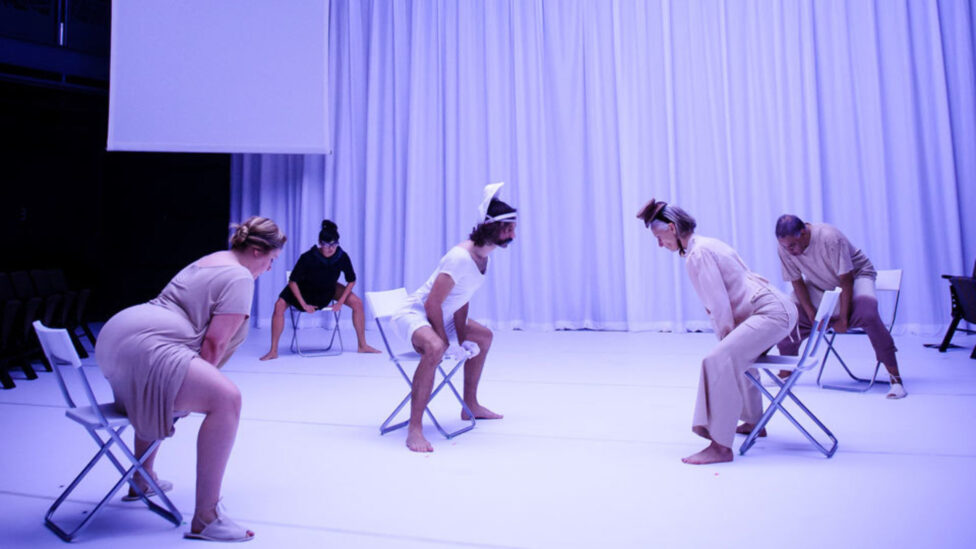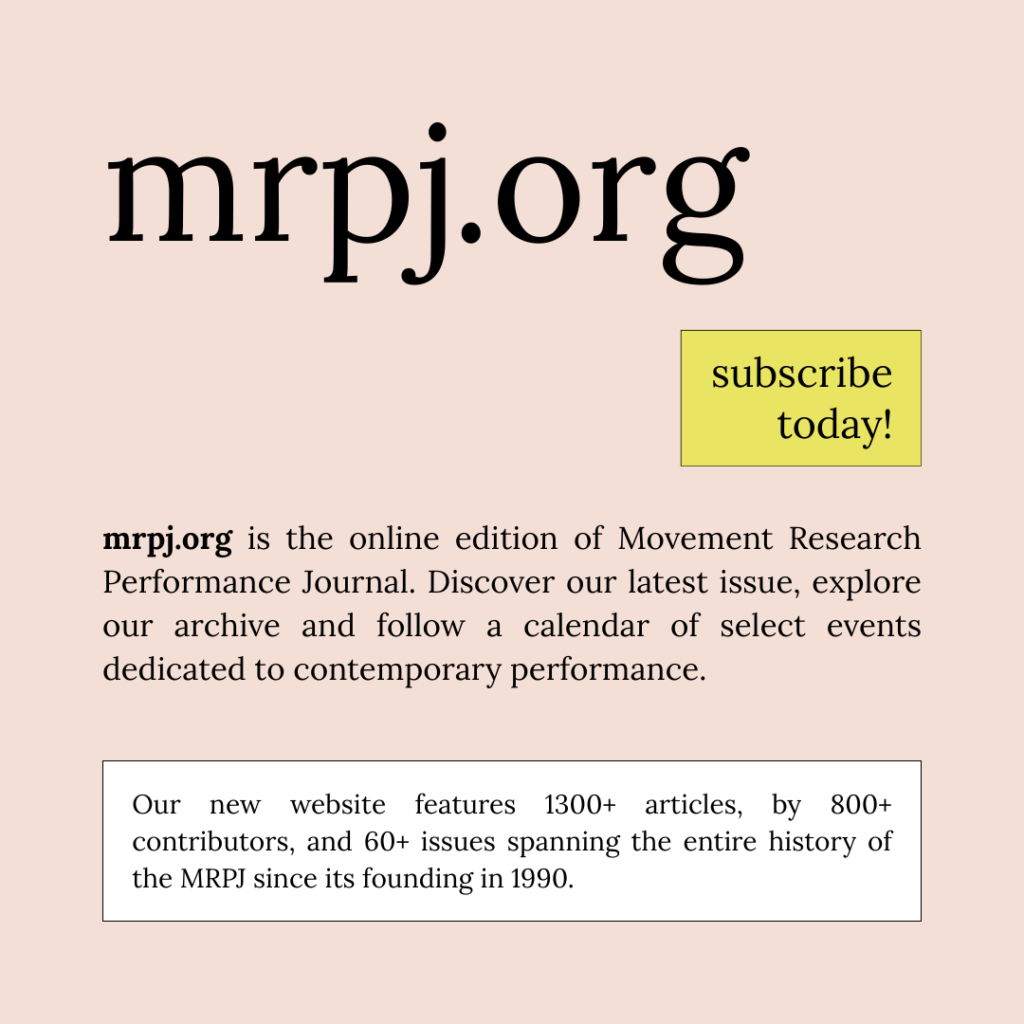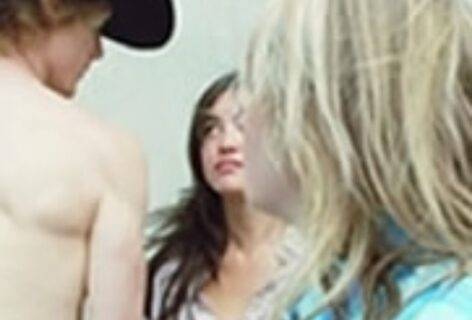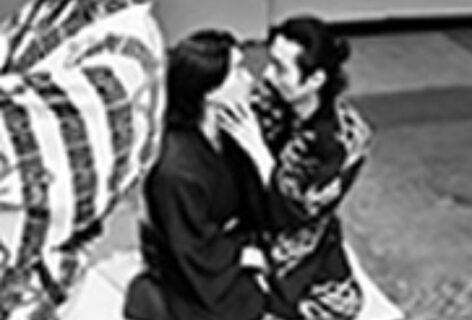“And lose the name of action” at Walker Art Center, Photo by Boru O’Brien O’Connell
Marissa Perel: How long was your process in making And lose the name of action?
Miguel Gutierrez: There are multiple answers to that question. In terms of actually rehearsing with people, we started working in April 2011, for September 2012 premier, but we would work in intensive chunks, three or four weeks at a time. Last fall, at the LMCC residency on Governor’s Island, we did work for six or seven weeks. So it was these different kinds of time periods throughout a year and a half. Then, leading up to that, there had been at least a year and a half of “research,” which involved interviewing people and reading.
MP: And the actual experience of your dad’s hospitalization.
MG: Right. That’s what I was writing about today. I wrote that in the time that I began to think about this show, my father got sick, and was in the hospital for four and a half months and recovered, and I was in and out of a pretty significant relationship, I lived in five different apartments. That really fucked me up when I wrote that down today! And I made two other pieces—actually I made three other pieces and did three other research projects with other artists.
I made I Say the Word with Jenny Holzer at the ICA, Boston, and Heavens What Have I Done, then I made You are gorgeous and I am coming and then I choreographed a piece for the Fondu Set in Australia. I did another research project with Luke George. I went to many, many countries to perform and teach.
After I wrote that down this morning, I thought, “No wonder I’m invested in incoherence!” Look at this! My life is insane. The only thing that has felt coherent throughout all that time is my relationship to my mind’s ideas, my subjective imagination. It would make perfect sense that this show is partly about a sense of un-tethered-ness, or perhaps a different, associative approach to tethering. Look at this crazy lifestyle!
My ideas for the piece were already underway while I was making Last Meadow. When Last Meadow premiered, Phillip Bither approached me to discuss commissioning the next piece. I’ve realized that most pieces are that, they’re someone asking you to do something [laughs]. You create some abstract deadline, and then it just goes. I’ve been thinking about that as a phenomenon of making art. There were so many different kinds of things that happened during the time frame of making that show.
“And lose the name of action” at MANCC, Photo by Chris Cameron
MP: When did you start studying Feldenkrais?
MG: I had already been going to Jimena Paz sporadically for Feldenkrais lessons, and then in the fall of 2010, in the midst of my dad’s illness, we were about to do a tour of Last Meadow in France, I had a really transformative experience with Jimena. I’ve had pretty serious back issues since my early thirties, and I had a lesson with her where I felt so mobile after; I was restored to my younger body. It was like I was given back my younger body while having all the self-awareness I have now as an older body.
I found that really compelling, and then when I went to France to do the tour of Last Meadow, I was afraid of the rigor of that tour, and I ended up looking at a lot of videos of Ruthy Alon, who had been an early student of Feldenkrais, and again I just kind of aped her, I just did what she was doing, because she looked amazing, and I got through the tour without being injured. I felt like something in me was changing, and I wanted to learn more about it.
So, I applied to the training program, and I got in. Then when my Dad got out of the rehabilitation center, we set him up with a Feldenkrais practitioner in Florida, and he immediately responded really well to it. I was really happy to see that there was this kind of approach to working with a person.
My father experienced aphasia. It’s not that he can’t speak, but some days he’s able to answer questions better than others, or commands better than others. So I liked watching him work with this practitioner who wasn’t really demanding anything of him, just working with where he is. I saw how favorably responded to it.
I thought, “This is pretty awesome! If this can do that for my Dad, then I want to work more on this with other people.” It’s been fascinating to walk into something—this keeps happening to me, in my thirties–I encounter things or artists or people who give language to something I’m either already doing or already interested in.
That happened to me with Deborah Hay. When I worked with her, I thought, “Oh my god, this is all stuff I’ve been getting at, but I didn’t have these words.” The ideology of Feldenkrais, of meeting someone where they are, feels pretty integral to who I am as a person, director and teacher—not trying to make someone into something else. In my friendships and artistic collaborations, I feel like I’m pretty in tune with that way of being and that way of thinking.
“And lose the name of action” at MANCC, Photo by Chris Cameron
MP: When you started working on And lose the name of action with all these things in mind, did you have a vision or an idea of what the piece would become?
MG: The one thing that has stayed closest to my original conception is the spatial design of the piece. I knew I wanted an “unusual” configuration with screens, the multiple surfaces for video projections. I wanted to create a deflection and disorientation from what is front and what is back. Aesthetically, I thought I was going to make something very different than what happened. I had been researching the brain, watching boring DVDs, reading books, and so much of that research was dry. I suspected that the piece would have a dryness to it, or a kind of rationalism to it, like a “powerpoint piece,” or the “lecture-demonstration–performance, ” where there’s an overhead projector, everyone’s wearing regular clothes, the house lights are on, and that’s it. What I did not expect to make was a big ole’ mutha-fuckin’ spectacle.
[laughs]
“And lose the name of action” at MANCC, Photo by Chris Cameron
MP: Were there segments in the work that were based on improvisation, or was there set choreography?
MG: There is some. Hilary [Clark] and I have little improvisational moments twice in the piece, both when I go over to her when she’s sitting in the chair and she gets up and we kind of talk, we talk and then we move and we talk, and then later, when we’re both screaming text and throwing each other around, that’s improvised, and then the section where we’re running around in the dark, that’s improvised, and it’s very short. I think there’s one other section that’s improvised by KJ [Holmes] and Luke [George].
The interesting thing for me was trying to find seamlessness between what is known and what is not known, or what is set and what is not set. I’ve been disappointed that there hasn’t been more writing on the actual movement aspect of the performance. I feel the movement is a really big achievement of the piece, and certainly inside the larger trajectory of my own work, because I was trying to capture something about the strangeness and surprise of improvisational movement, and the way in which value is dispersed in all these different directions. If I get up and say, “I’m going to create this action, this sequential analog of action,” I’d be using a choreographic method for conventional dance material. I feel like the choreography of this piece is a real success because the movement reflects the spatial values, the temporal values, and the dramaturgical values of improvisation, which was my vested interest in the making of this piece.
“And lose the name of action” at BAM, Photo by Bylan Douglas
MP: I think the reason why there’s some emphasis on the text is simply because of the text becoming a centerpiece at points. It’s also easier for people to attach value to language.
MG: Sure. Always.
MP: Some people enjoyed your use of language, and others found it totally problematic, but I haven’t heard anyone say that about the dance, or that it is a dance. I was definitely invested in the text, because I’m invested in it. But because of it, and the style of the costumes, there’s a way in which we could characterize what you’re doing as experimental theater. It’s curious to me that because you choose to use a script, or you have a song, suddenly the dance is called into question.
I don’t think your piece is about theater in a way that a person could interpret it to be about theater. The parts of just dancing were where I felt inside of the piece. I felt empathic responses to this idea of disintegration or devolution from the relationship between action and sense and action and language. It made me remember experiences of my own body making sense to me, and not making sense to me, and the feeling of something being lost to me in the process of trying to understand it. That’s a crazy thing to choreograph, or direct!
MG: That loss that you’re describing, or detachment—estrangement, even, from a body’s experience, is for me a huge conundrum working in a form where the space of the person doing it and the space of someone watching it will never be the same. All kinds of things are projected onto that experience because somehow that experience is often valued as a visual rendering. If you come from dance, your body is trained to cohere, and integrate information, and that comes with all the baggage of visual rendering.
Really, dance is an unfolding proposition. We are so concerned with our presentation of ourselves, but I am interested in an experience of dance that is away from that. This body is central to allowing me to go away. If I didn’t have this body, I wouldn’t be able to go away because I wouldn’t be there in the first place. When I think about all the different places I was in the course of making this piece, geographically or emotionally—despair, love, abandonment, fear, mortality, just so many crazy places I went to, in myself, in this body, I experienced these things, I went through these things, and somehow I’ve always wanted dance or performance to accept that multiplicity, and to propose it, or offer it, because I don’t have an investment in coherence, actually, or in believing that things arrive in integrated ways.
“And lose the name of action” at BAM, Photo by lan Douglas
MP: Maybe that’s a way to talk about the script, as well. I’m thinking about the number of times in the piece when people were uttering and you didn’t know what it was, when KJ and Luke were talking and you don’t know what they were saying, and both Hilary and Michelle [Boulé] have these moments of talking to themselves, or even moving like they’re schizophrenic, or as if they are doubled. It took me a long time not to be frustrated with that and to realize that I can just watch their mouths move.
Then, in the video, there is a lapse between when you’d see Paul [Duncan] speaking and when you’d hear his speech, which I loved. It’s a crisp, clear depiction of one’s consciousness being muted. The piece had many different modes of speech; singing, talking to yourself, silent soliloquies, dialogues, and that literal script, when the performers were holding those folders, and yelling “fuck you.” At that moment language takes over. What is your experience of that moment in the piece, and how is that relating to the other elements of the piece?
MG: Well I love that it’s like this weird rupture, “and now we’re talking and you can hear it.” You can understand it, but it’s also this obtuse argument, and it’s this bad acting thing—we’re trying to be good actors, but we’re not very good actors [laughs]—and we’re reading a script because none of us could memorize the whole thing, or anyway—Ishmael [Houston-Jones] probably couldn’t [laughs]. We’re just enjoying something about it. I’ll also just put forward that rarely do I ever experience anxiety about things being different from each other, inside a thing.
I guess it was my early training with Joe Goode, where so much of the compositional training with Joe was juxtaposing things right next to each other, and sort of living for the frisson between the two things, and then just stepping back and enjoying the way in which meaning exists in these relationships between events. That compositional training landed so deeply in me, it’s almost like I found my home in that idea and it’s something I’ve employed and deployed ever since.
The idea that all of a sudden you can just be dropped into this crazy little Grecian situation comedy is really satisfying. So I always really enjoy that part, because I get to just play off Ishmael, who is so funny and ridiculous and game for anything, always. It’s also this weird father-son thing for me, like when you go off to college and you come home and you’ve read all those great books, and your Dad says these boring old things and you’re like, “Ugh! You don’t know what all the new books are saying!” The kind of hateful way that young people can be, it taps into a lot of those archetypes for me.

MP: There’s a way where it felt like an assault, when you were screaming, and that was the only time in the piece where it felt like there was an assault, like you were trying to test our ability to sit there, which, for you, is tame [laughs] compared to other things.
MG: That’s interesting. That’s nice. Yes—and it’s all words, doing that. It makes sense. Certainly in my Dad’s situation, words have been used in all sorts of fucked up ways, like his idiot physical therapist, or the words of that idiot doctor. Words become so powerful there, and it’s enraging, because you’re having this different physical experience and the person is like, “Clearly, this person is…” and you’re like, “How could they be saying that? I’m right here. I’m the person who knows what the fuck is going on.”
MP: There’s a lot of rage in that.
MG: There’s huge rage in the way language then becomes the de facto way of constructing meaning, or it’s the reliable way. It’s like fuck you, all I have to do is touch this person to know that they’re tired, or sick, or hungry. There are so many other ways of experiencing knowing.
I’m just getting flashes of memories of participating in public demonstrations, and of my mother, a Spanish speaker in a primarily English-speaking country. Throughout my Dad’s crisis, all of the medical professionals flat-out ignored her; “Here’s this woman who doesn’t speak English, let’s ignore her.” She was the person who knew better than anyone what was going on with my Dad, but her knowledge was not respected. She was incredibly frustrated and angry as a result of that. I’ve been so aware in my life of when people wanted to be heard and couldn’t be heard. Being bicultural you understand really early on that he who holds the language holds the power. Of course you’re going to want to fuck with language. You’re like, “what is this fucking tool?”












